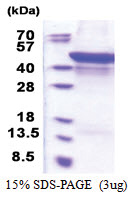MMP-1 (100-469, His-tag) Human Protein
Other products for "MMP1"
Specifications
| Product Data | |
| Species | Human |
| Expression Host | E. coli |
| Expression cDNA Clone or AA Sequence |
MGSSHHHHHH SSGLVPRGSH MGSFVLTEGN PRWEQTHLTY RIENYTPDLP RADVDHAIEK AFQLWSNVTP LTFTKVSEGQ ADIMISFVRG DHRDNSPFDG PGGNLAHAFQ PGPGIGGDAH FDEDERWTNN FREYNLHRVA AHELGHSLGL SHSTDIGALM YPSYTFSGDV QLAQDDIDGI QAIYGRSQNP VQPIGPQTPK ACDSKLTFDA ITTIRGEVMF FKDRFYMRTN PFYPEVELNF ISVFWPQLPN GLEAAYEFAD RDEVRFFKGN KYWAVQGQNV LHGYPKDIYS SFGFPRTVKH IDAALSEENT GKTYFFVANK YWRYDEYKRS MDPGYPKMIA HDFPGIGHKV DAVFMKDGFF YFFHGTRQYK FDPKTKRILT LQKANSWFNC RKN
|
| Tag | His-tag |
| Predicted MW | 45.0 kDa |
| Concentration | lot specific |
| Purity | >90% by SDS - PAGE |
| Presentation | Purified |
| Buffer | Presentation State: Purified State: Liquid purified protein Buffer System: 20 mM Tris-HCl buffer (pH 8.0) containing 10% glycerol, 0.4M Urea |
| Preparation | Liquid purified protein |
| Protein Description | Recombinant human MMP1 protein, fused to His-tag at N-terminus, was expressed in E.coli. |
| Storage | Store undiluted at 2-8°C for one week or (in aliquots) at -20°C to -80°C for longer. Avoid repeated freezing and thawing. |
| Stability | Shelf life: one year from despatch. |
| Reference Data | |
| RefSeq | NP_001139410 |
| Locus ID | 4312 |
| UniProt ID | B4DN15 |
| Cytogenetics | 11q22.2 |
| Synonyms | CLG; CLGN |
| Summary | This gene encodes a member of the peptidase M10 family of matrix metalloproteinases (MMPs). Proteins in this family are involved in the breakdown of extracellular matrix in normal physiological processes, such as embryonic development, reproduction, and tissue remodeling, as well as in disease processes, such as arthritis and metastasis. The encoded preproprotein is proteolytically processed to generate the mature protease. This secreted protease breaks down the interstitial collagens, including types I, II, and III. The gene is part of a cluster of MMP genes on chromosome 11. Mutations in this gene are associated with chronic obstructive pulmonary disease (COPD). Alternative splicing results in multiple transcript variants, at least one of which encodes an isoform that is proteolytically processed. [provided by RefSeq, Jan 2016] |
| Protein Families | Druggable Genome, Protease, Secreted Protein |
| Protein Pathways | Bladder cancer, Pathways in cancer, PPAR signaling pathway |
Documents
| FAQs |
| SDS |
Resources
Recombinant Protein Resources |
{0} Product Review(s)
0 Product Review(s)
Submit review
Be the first one to submit a review
Product Citations
*Delivery time may vary from web posted schedule. Occasional delays may occur due to unforeseen
complexities in the preparation of your product. International customers may expect an additional 1-2 weeks
in shipping.






























































































































































































































































 Germany
Germany
 Japan
Japan
 United Kingdom
United Kingdom
 China
China
